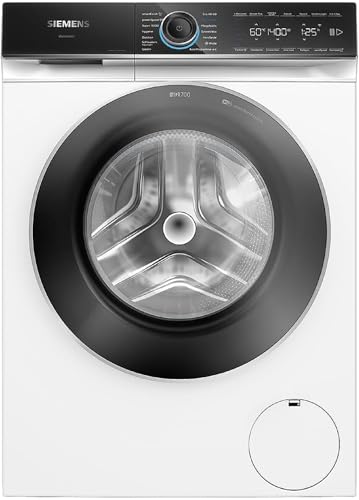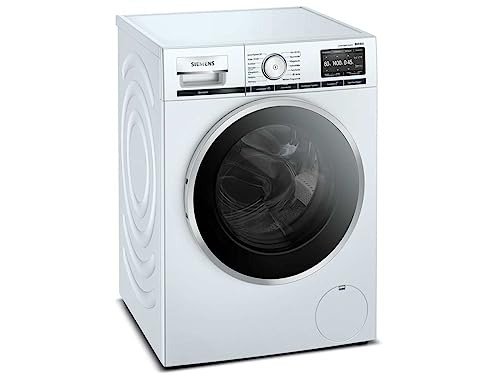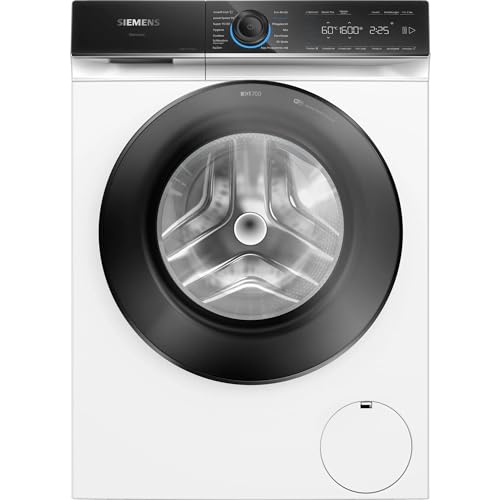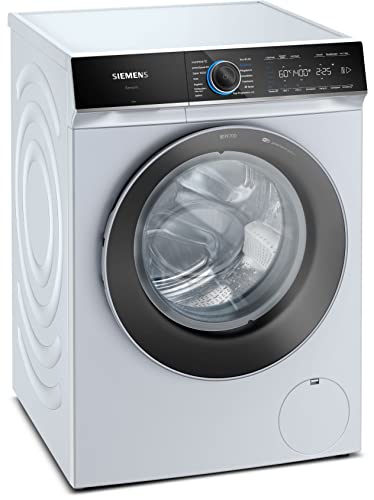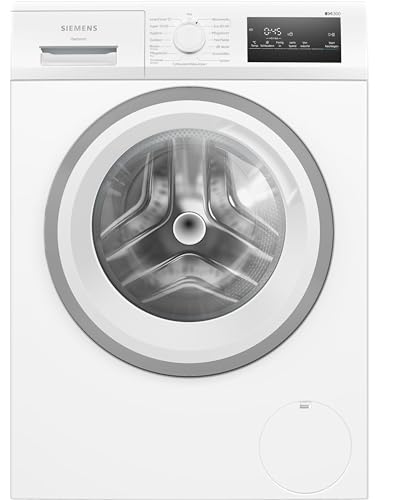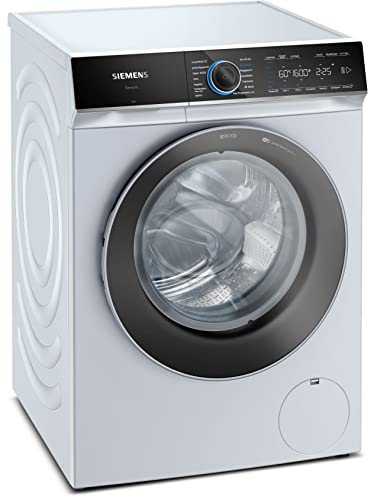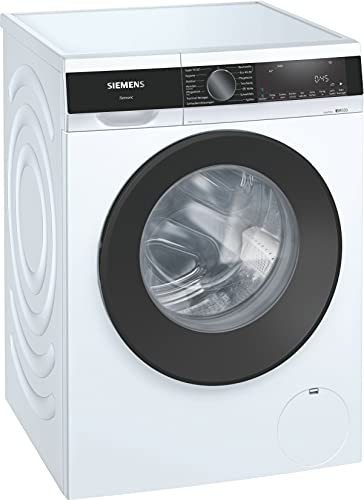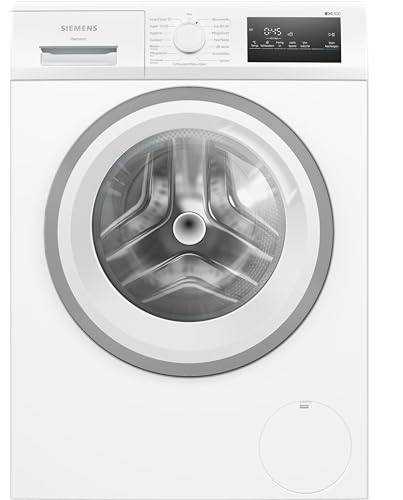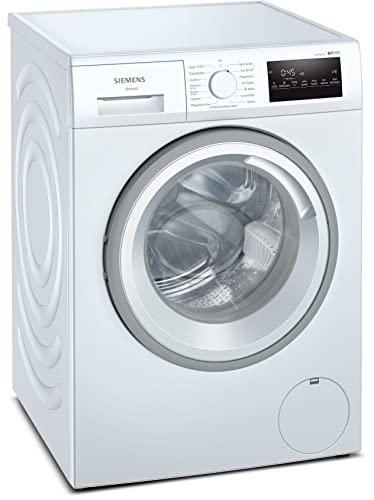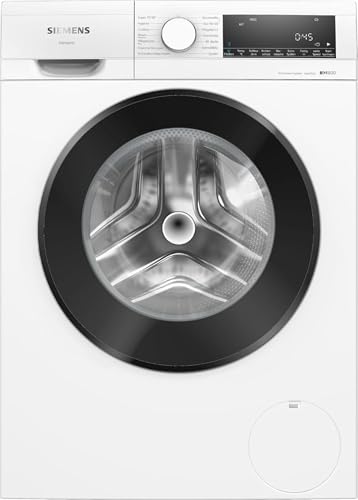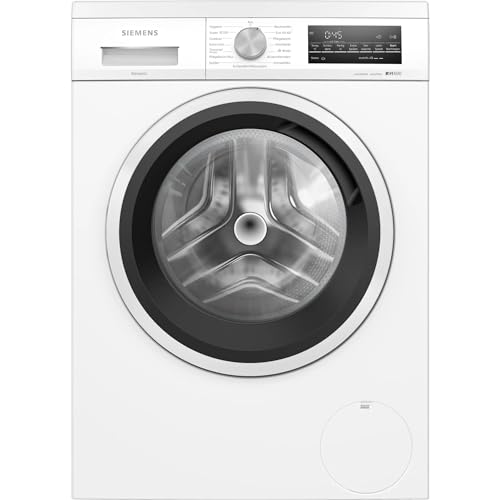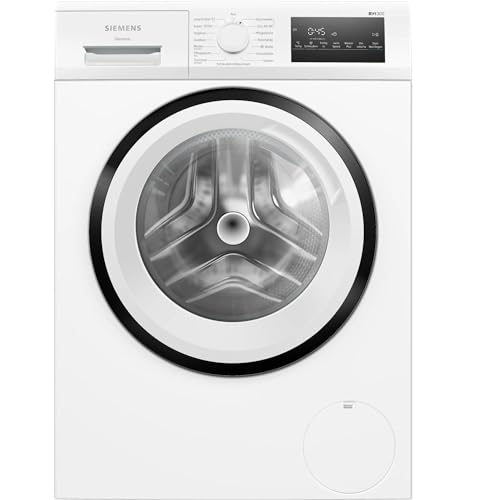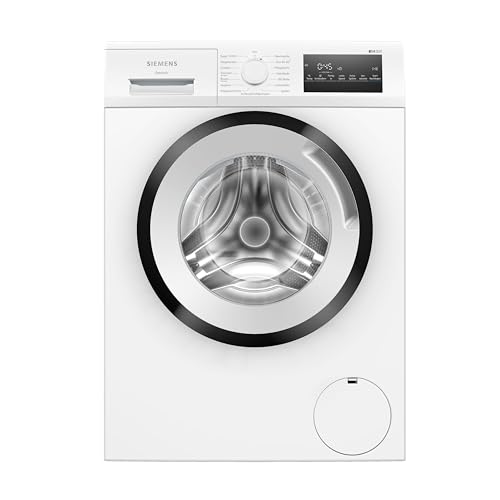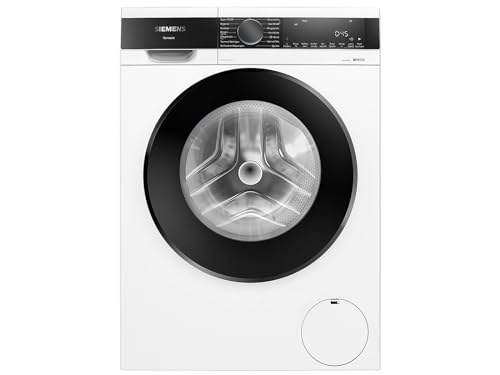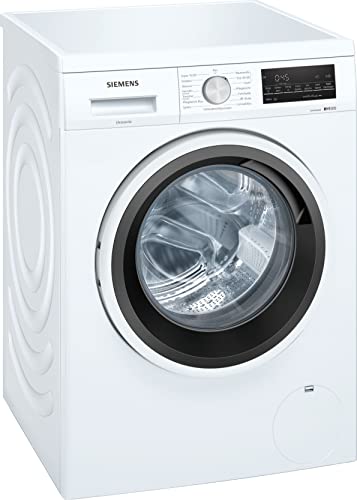Are Siemens washing machines good?
Siemens produces some of the best washing machines on the market. They rank #3 among all washing machine brands, with an overall score of 7.8 (by comparison, the market average for washing machines is 7.1 points).
Users rate Siemens washing machines with 8.8 points, placing them at #1 in the ranking of the best brands based on user reviews. The average rating for other washing machines is 8.1 points.
Siemens is undoubtedly one of the best brands on the market. If you are looking for similar quality washing machines, also consider brands such as Samsung, Miele, LG, or Haier.
(The ranking includes 22 brands, excluding those with fewer than three products in the database.)
The following table ranks washing machine brands based on their total score.
[horizontal-chart-39866564]
The best Siemens washing machines (with the highest total scores) are as follows.
- Siemens WG44B2040 iQ700 (Total score: 8.24 points; Capacity: 9 kg)
- Siemens WM14VG43 iQ800 (Total score: 8.14 points; Capacity: 9 kg)
- Siemens WG46B2070 iQ700 (Total score: 8.08 points; Capacity: 9 kg)
What are the main advantages of Siemens washing machines?
Siemens washing machines offer the following advantages compared to other brands.
- Larger drum volume: The average drum volume is 63 litres, higher than the market average of 58 litres. The most common capacity is 9 kg.
- Lower energy consumption: Siemens washing machines consume an average of 49 kWh per 100 cycles, 6 kWh less than the market average of 55 kWh. Most models are rated in energy efficiency class A.
- High maximum spin speed: All Siemens models achieve a maximum spin speed of 1400 rpm, with some models reaching up to 1600 rpm.
- Low minimum spin speed: All Siemens models can operate at a minimum spin speed of 400 rpm, suitable for washing delicate items. About 33% of washing machines on the market do not achieve this value.
- Quieter operation: Siemens washing machines have a spin noise level of 71 dB and a washing noise level of 49 dB, approximately 4 dB quieter than the market average (75 dB for spinning, 53 dB for washing). Most models fall within the A sound emission class.
- Durable motor: All Siemens washing machines are equipped with the iQdrive inverter motor and come with a 10-year warranty.
- Versatile washing functions: Most Siemens models include features such as Vario Speed quick function, anti-stain function, extra rinse, pre-wash, and anti-crease function (Easy Iron or rinse hold). Advanced models may also offer Mini Load, Water+ function, silent wash, and soak function.
- Advanced features: Siemens washing machines include systems such as AquaStop, laundry detection (waterPerfect Plus), foam control, unbalanced load detection, Soft drum special drum design, and anti-vibration design.
- Additional technologies in advanced models: Features such as voltMonitor, steam technology, automatic dosing (i-Dos), memory/favourite programs, remote diagnostics, aquaSensor, and Wi-Fi connectivity (controlled via the Home Connect app) are available in higher-end models.
What are the main disadvantages of Siemens washing machines?
Siemens washing machines have the following disadvantages compared to other brands.
- Lower user ratings: Siemens washing machines have an average user rating of 8.8 points, lower than the market average of 8.1.
- No slim models available: Siemens does not produce slim washing machines, limiting options for compact spaces.
- Higher cost: Siemens washing machines are £400 more expensive than the market average (£780 vs. £380) and have a lower quality-price ratio (6.2 vs. 7.1 points).
- Less popular: Siemens washing machines are less popular than the market average (8.5 vs. 6 points).
- Higher water consumption: Siemens washing machines consume 1 litre more water per cycle compared to the market average (47 L vs. 46 L per cycle).
- Lack of specialised cycles: No Siemens washing machine includes Baby Care, Duvet, or Anti-Allergy cycles.
- Missing advanced features: Siemens washing machines lack pre-mix technology, automatic drawer cleaning, AI technology, energy-saving mode, or a water jets system.
Who manufactures Siemens washing machines?
Siemens washing machines are produced by BSH Hausgeräte GmbH, a subsidiary of the German company Robert Bosch GmbH. Founded in 1967 as a joint venture between Bosch and Siemens, BSH Hausgeräte is now one of the world's largest appliance manufacturers. Although Siemens and Bosch have operated as distinct brands, they have shared the same manufacturing resources. In 2015, Bosch acquired full control of BSH, while the Siemens brand remains licensed for appliances produced by BSH.
Siemens has been active in the appliance market since the early 20th century. In the 1930s, it achieved great success with the introduction of the first electrical household devices. Over time, the brand has become synonymous with innovation and reliability. In the 1980s, it launched the fully automatic SIWAMAT washing machines, revolutionising the industry with advanced features such as automatic program selection and digital displays. Siemens washing machines are manufactured in various countries, including Germany, Spain, and Poland.
What are the different series of Siemens washing machines?
Siemens washing machines are divided into the following series.
- iQ300 series: Basic models equipped with foam control, unbalanced load detection, and laundry detection systems. They use the iQdrive inverter motor, which is quiet and durable (with a 10-year warranty), and feature aquaStop technology. They include quick function (Vario Speed), speedPack L (super30 and super15 programs), pre-wash, and anti-vibration design. The LED touch display provides commands and status updates. Some models also feature extra rinse, self-cleaning, rinse hold, steam technology, anti-crease function (SmartFinish), voltMonitor, and a soft drum for gentle washes. They belong to energy classes A or B, with capacities of 7-8 kg and between 11 and 15 washing programs. Prices range from £400 to £650.
- iQ500 series: A more advanced range than the iQ300, adding the waterPerfect Plus system to optimise water usage based on fabric and laundry load, along with a larger LED display with sensor buttons. Some models include a stain removal system for stains like wine and grease, an anti-rubbing function, and LED drum lighting. These washing machines belong to energy classes A to C, with capacities of 8-9 kg and 14-15 washing programs. Prices range from £500 to £1,100.
- iQ700 series: This series includes all the features of the iQ300 and iQ500, with further enhancements such as automatic stain removal (six standard options plus ten more via HomeConnect), steam technology (SmartFinish), hygiene function, MiniLoad option, and aquaSensor for optimal rinsing. Thanks to Wi-Fi connectivity via the Home Connect app, functions can be controlled remotely. Some models also feature Water Plus, soak function, and automatic dosing (i-Dos), while integrated models include timeLight, projecting the remaining time and program status onto the floor. These washing machines are energy class A for standalone models and C for integrated models, with capacities of 8-10 kg and typically 19 washing programs. Prices range from £750 to £1,200.
- iQ800 series: The flagship range, including all features of the iQ700, offers an advanced stain removal system for 16 types of stains, a silent wash function for night-time use, and the powerSpeed system. The StayClean drawer, high-resolution TFT display, consumption preview before starting the program, and dosage recommendation enhance usability. All models are energy class A, with a capacity of 9 kg and 16 washing programs, priced around £700.
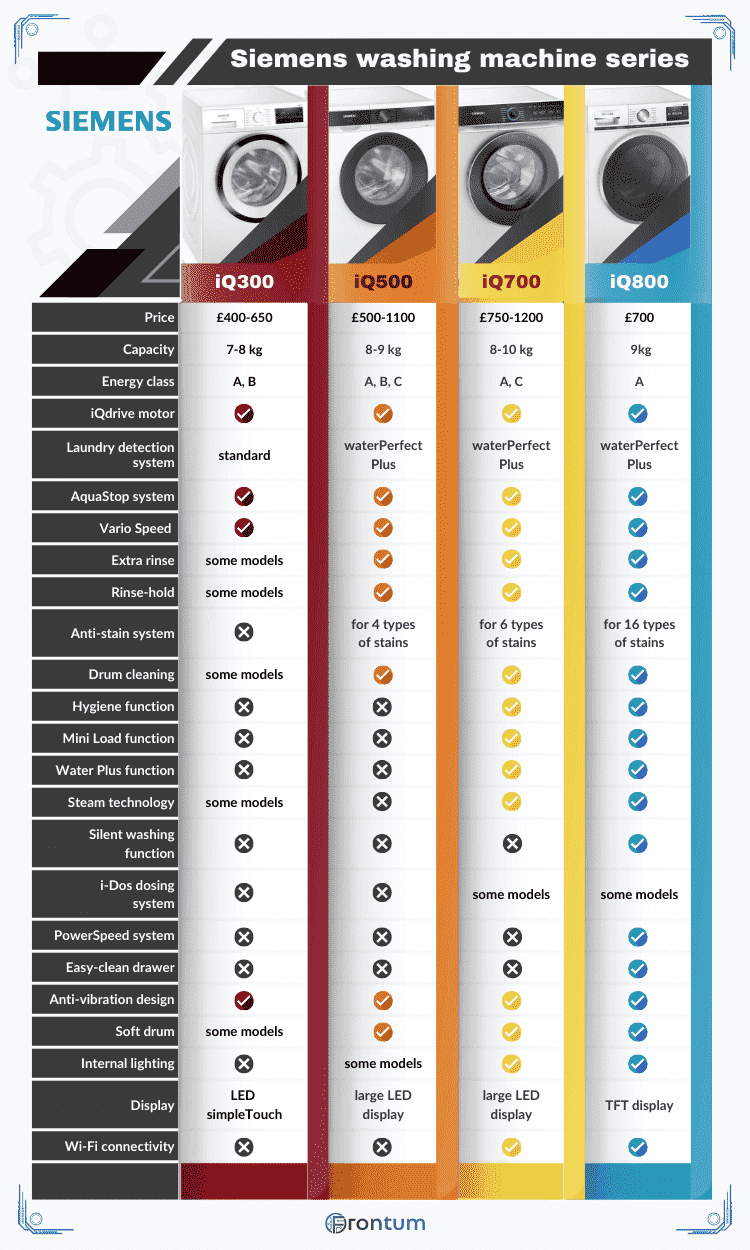
What is the warranty period for Siemens washing machines?
Siemens washing machines come with a standard manufacturer's warranty of 24 months, covering all appliances, and a specific 10-year warranty for the iQdrive motor. To activate the 10-year motor warranty, register your product on MySiemens within 60 days of purchase.
How much do Siemens washing machines cost?
Siemens washing machines are priced between £400 and £1,200, with an average price of around £780. This places them at #21 in the price ranking out of 22 brands (from cheapest to most expensive), making them generally more expensive than many other brands. The average washing machine on the market costs only £380.
The most affordable models belong to the iQ300 series, priced between £400 and £650, while mid-range models in the iQ500 series can cost up to £1,100. The iQ700 series, among the most expensive, ranges from £800 to £1,200.
The price distribution of Siemens washing machines is shown in the chart below.
[vertical-chart-70303258]
In terms of value for money, Siemens washing machines rank #20 among 22 brands, with an average score of 6.2 points (lower than the market average, which is 7.1 points). If you are looking for the best value for money, Siemens may not be the ideal choice for you.
Note: Brands with fewer than six products in the database were not included in the ranking.
What should you consider when choosing the best Siemens washing machine?
To choose the best Siemens washing machine, consider the capacity, drum volume, dimensions, energy consumption, water consumption, spin efficiency, washing noise level, motor type, number of washing programs, and features.
What capacities are available for Siemens washing machines?
Siemens washing machines have capacities ranging from 7 to 10 kg. The most common capacities are 9 kg (about half of the models) and 8 kg. The drum volume of Siemens washing machines varies between 55 and 70 litres, with an average of 65 litres (higher than the market average of 58 litres).
The following chart shows the distribution of capacities for Siemens washing machines.
[pie-chart-80479566]
Siemens washing machines occupy a space between 0.27 and 0.3 m³, with an average of about 0.29 m³ (similar to most other models on the market). The depth varies from approximately 54 to 60 cm, confirming the absence of slim models. The standard width of all models is approximately 60 cm.
What is the energy efficiency of Siemens washing machines?
Siemens washing machines are energy-efficient, with energy efficiency classes ranging from A to C. More than half of the models belong to class A, while none are in classes D, E, F, or G.
In comparison, about 39% of all washing machines on the market belong to class A, 17% to class B, while the remaining models are distributed across classes C-G. Siemens lacks models in lower classes, demonstrating greater energy efficiency compared to many other brands.
The following chart shows the energy class distribution of Siemens washing machines.
[pie-chart-52136745]
Siemens washing machines consume between 40 and 66 kWh per 100 cycles, with an average of 49 kWh. This places them at number 3 out of 22 brands in terms of energy consumption. By comparison, the average washing machine on the market consumes about 55 kWh per 100 cycles.
Water consumption ranges from 44 to 50 litres per cycle, with an average of 47 litres, positioning Siemens at 11th place out of 22 brands for water consumption.
What is the spin efficiency of Siemens washing machines?
The spin efficiency of Siemens washing machines falls within classes A or B, with class B being the most common (89%). Spin-drying efficiency class B covers 85% of washing machines on the market and indicates the ability to remove water during the spin cycle, reducing drying time and energy consumption. This efficiency is closely tied to the maximum spin speed, which affects how effectively water is extracted from garments.
Siemens washing machines have maximum spin speeds ranging from 1400 to 1600 rpm, with 1400 rpm being the most common. Higher spin speeds allow for greater water removal, enabling clothes to dry faster.
All Siemens washing machines can spin at a minimum speed of 400 rpm, ideal for delicate fabrics like wool, which require low speeds to prevent damage. Only 67% of washing machines on the market achieve this minimum speed.
How noisy are Siemens washing machines?
The spin noise of Siemens washing machines ranges from 66 dB to 74 dB, with an average value of 70.5 dB. This places them at position 3 out of 22 brands in terms of quietness. The average washing machine on the market produces about 75 dB of noise during the spin phase. When considering the noise level of a washing machine, the spin noise level is the most relevant as it represents the loudest part of the washing process.
Siemens washing machines fall within sound emission classes A or B. Class A indicates a spin noise level below 73 dB, while class B refers to a level between 73 and 76 dB.
The following chart shows the noise distribution among Siemens washing machines.
[vertical-chart-75404404]
For washing noise, Siemens models range from 41 dB to 49 dB, with 49 dB being the most common value (which is lower than the market average of 53 dB).
How many washing programs do Siemens washing machines offer?
Siemens washing machines feature 11 to 19 washing programs, with an average of about 15, similar to most other brands. Common programs include Cotton, Cotton Color, Eco 40-60, Easy Care, Easy Care Plus, Quick/Mixed, Delicates/Silk, Wool, Duvets, Drum Clean, Outdoor, Shirts, and Super 15'/30'.
However, Siemens washing machines do not include Baby Care, Duvet, or Allergy cycles.
The Eco cycle of Siemens washing machines lasts between 206 and 235 minutes, with an average of 220 minutes (close to the market average of 218 minutes). Most Siemens models have 2-3 quick cycles under one hour—powerSpeed 59', Quick/Mix, and Super 15'/30', with the fastest cycle lasting 15 minutes.
Siemens washing machines include the following features for customising wash cycles.
- Quick function Vario Speed: reduces program duration.
- Anti-crease Easy Iron function: reduces creases by adjusting the final spin or drum movement.
- Rinse hold function: pauses the cycle with laundry soaking to prevent creases.
- Anti-stain function: removes four common stains: wine, grease, blood, and grass.
- Extra rinse function: adds an extra rinse to remove detergent residues.
- Pre-wash function: performs an initial wash for heavily soiled clothes.
Advanced models also offer the following washing functions.
- Mini Load function: quickly washes small loads or individual items with an optimised program.
- Water+ function: uses more water, suitable for sensitive skin or gentler treatment.
- Silent function: minimises noise during the wash cycle.
- Soak function: keeps laundry in water longer before the main cycle, ideal for stubborn dirt.
What are the common features of Siemens washing machines?
Siemens washing machines include between 6 and 16 features, with an average of 11 features.
The following chart shows the distribution of the number of features in Siemens washing machines.
[vertical-chart-94056216]
Nearly all Siemens washing machines include the following features.
- AquaStop system: prevents water damage caused by leaks or device malfunctions.
- Laundry detection system: waterPerfect Plus uses sensors to maximise water efficiency by detecting fabric type and load size with 256 levels of precision.
- Foam control system: monitors the amount of foam generated during the wash cycle and adjusts the process.
- Unbalanced load detection system: detects imbalances in laundry distribution during washing and spinning.
- Soft drum special design: speeds up laundry care with asymmetrical vectors for gentle yet efficient washes.
- Anti-vibration design: enhances stability and reduces noise.
Every Siemens washing machine is equipped with a Siemens iQdrive inverter motor. This motor is quiet, intelligent, and highly durable, covered by a 10-year warranty. Most Siemens models also include features such as voltMonitor (indicating power fluctuations).
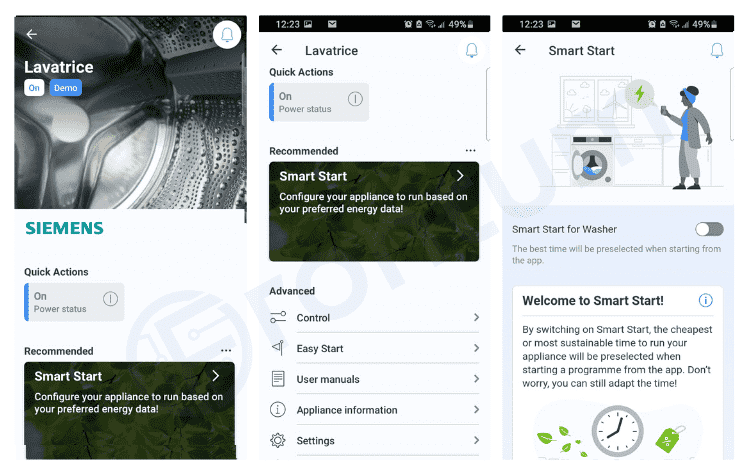
Advanced models feature the following additional functionalities.
- Steam technology
- Automatic dosing system: i-Dos adjusts detergent based on fabric type, water hardness, and dirt level.
- Memory/favourite programs
- Remote diagnosis: customer service can access the machine online to identify issues.
- aquaSensor: optimises rinsing for cleaner laundry.
- Wi-Fi connectivity: managed via the Home Connect app.
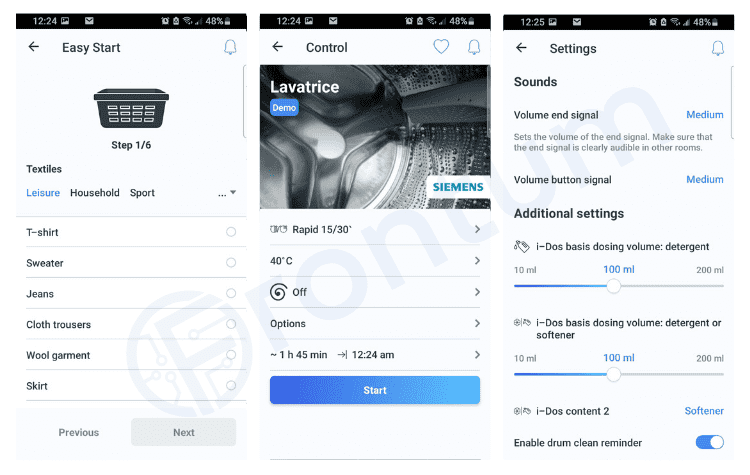
However, Siemens washing machines lack pre-mix technology, load balancing systems, automatic drawer cleaning, AI technology, energy-saving mode, or a water jets system.
Front-loading or top-loading: which type of Siemens washing machine is better?
Siemens primarily produces front-loading washing machines. The availability of top-loading models is limited.

